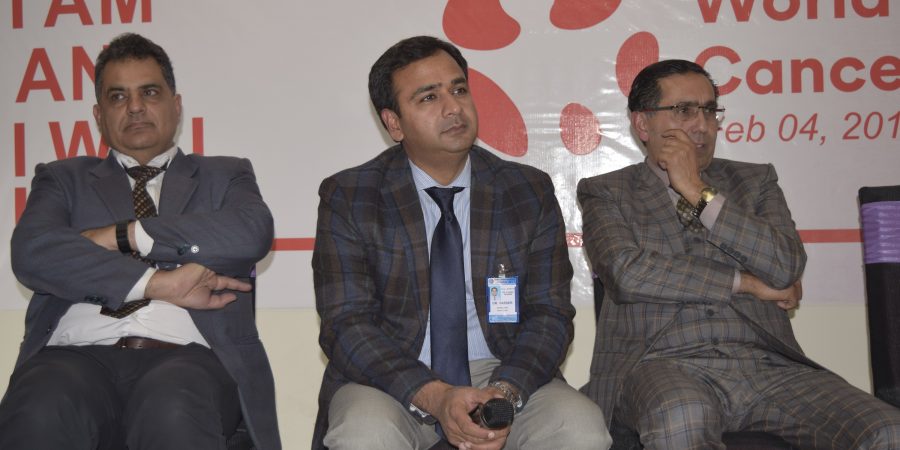Shifa Int’l Hospital organizes awareness seminar on cancer

ISLAMABAD, FEB 05 (DNA) – 9.6 million people die each year worldwide from cancer. That’s more than HIV/AIDS, malaria and tuberculosis combined.
If we don’t act; experts project cancer deaths to rise to 13 million, by 2030. More than one third of cancer cases can be prevented.
Another third can be cured if detected early and treated properly. By implementing resource-appropriate strategies on prevention, early detection and treatment, we can save up to 3.7 million lives every year, Dr. Muhammad Farrukh Consultant Radiation Oncologist at Shifa International Hospital, Islamabad said.
He was addressing the participants of an awareness seminar against cancer at Shifa International Hospital (SIH).
Every year, on 4 February, World Cancer Day is marked, aims to save millions of preventable deaths each year by raising awareness and education about cancer.
2019 marks the launch of the 3-year ‘I Am and I Will’ campaign. ‘I Am and I Will’ is an empowering call-to-action urging for personal commitment and represents the power of individual action taken now to impact the future.
Dr. Farrukh said that Cancer shall be the leading cause of death surpassing heart illness by year 2030 according to W.H.O. (World health organization), he shared 7 warning signs of cancer; (CAUTION) Changes in bathroom habits, A sore that does not heal, Unusual discharge and bleeding from natural orifices, Thickness or lumps in the breast or other places, Indigestion and difficulty in swallowing, Obvious changes in moles or warts and Nagging cough and hoarseness.
He informed the audience that Pakistan is the 7th most populous country with estimated cancer incidence of 148,041 new cases, 101,113 cancer related deaths (48,449 Men & 52,664 Women) in 2012, & a prevalence of 344,243 living cancer patients.
The age standardized ratio is more in females (128 Women & 95 Men per 100,000 populations respectively).
Dr. Sanam Yasir, Consultant Radiologist SIH said that cancer is a disease which occurs when changes in a group of normal cells within the body lead to uncontrolled, abnormal growth forming a lump called a tumour; this is true of all cancers except leukaemia (cancer of the blood).
If left untreated, tumours can grow and spread into the surrounding normal tissue, or to other parts of the body via the bloodstream and lymphatic systems, and can affect the digestive, nervous and circulatory systems or release hormones that may affect body function.
She added cancer diagnosis can be expedited through imaging (Localized X- Rays, Mammography, ultrasound, CT/ MRI Scans and PET scans, etc.) but mainly rests on tissue diagnosis acquired from a simple biopsy of the area of concern.
Dr. Ayaz Mir, Consultant Oncologist SIH said there are more than 100 types of Blood Cancer. Many blood cancers can be cured by Bone Marrow or Stem Cell Transplantation from patients own or a donor’s stem cells.
Transplant is expensive (Rs. 15-25 Lac) and many patients cannot be cured due to affordability issues, he underlined.
He said that it is essential to develop a culture of blood donation and research amongst young people (schools and colleges) in fight against cancer.
Pain Medicines for Cancer are unavailable due to overzealous regulations in the country. “Blood Cancer does not mean a death sentence.
Many types have a high (70-80%) cure rate. Early detection is easy and expert consultation is essential, Dr. Ayaz remarked.
Dr. Yasser Rehman, Consultant Medical Oncologist SIH said that today, more than half (65%) of cancer deaths are happening in the least developed parts of the world.
Equal access to cancer prevention, diagnosis, treatment and care can save lives. Through raising the public literacy and understanding around cancer, we reduce fear, increase understanding, dispel myths and misconceptions, and change behaviors and attitudes.
He added that the treatment of cancer depends on its type (and its sub-type) and on extent of disease after stage determination.
Surgery, chemotherapy, radiation therapy, immunotherapy, targeted therapy are some of the common available options in cancer management.
The sequencing of such complicated treatment is meticulous and often requires clinicians to sit under one roof in a multi-disciplinary meeting where pathologist, radiologist, surgeon, medical oncologist, radiation/ clinical oncologist and others assemble to discuss the most appropriate way to handle a cancer case based on scientific evidence and according to the needs pertinent to the patient.
Dr. Muhammad Israr, Consultant Maxillofacial Surgeon discussed about the head and neck cancer, its risk factors and treatment.
He informed the audience that Oral cancer is the 6th most common cancer in the world. He advised the audience that detailed oral examination must always be part of routine medical and dental exam and preventive measures should take priority in management and control of oral cancer.
Reduce your risk of cancer by staying healthy; Stay away from all forms of tobacco (cigarette, sheesha, niswar, hukka), Avoid fast food, preserved foods, Food colors, broiler chicken and excess white sugars, Preserve nature and environment, Avoid eating in foam cups and disposable plates, use paper plates, he advised.=DNA
=====================
Related News

Pakistan among 9 poor countries producing 90pc cigarettes for world: Study
LONDON, APR 24 (DNA): Recently unveiled study of London’s Imperial College on smoking titled “Tobacco’sRead More

Plastics pollution issue needs inclusive action to protect nature
ISLAMABAD, APR 22 /DNA/ – Deputy Chief of Mission (DCM), U.S. Embassy Islamabad, Andrew SchoferRead More


Comments are Closed